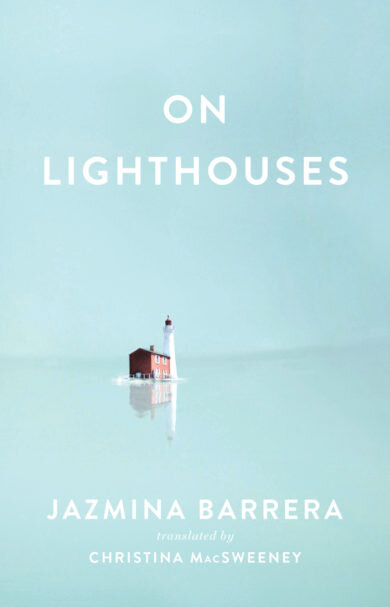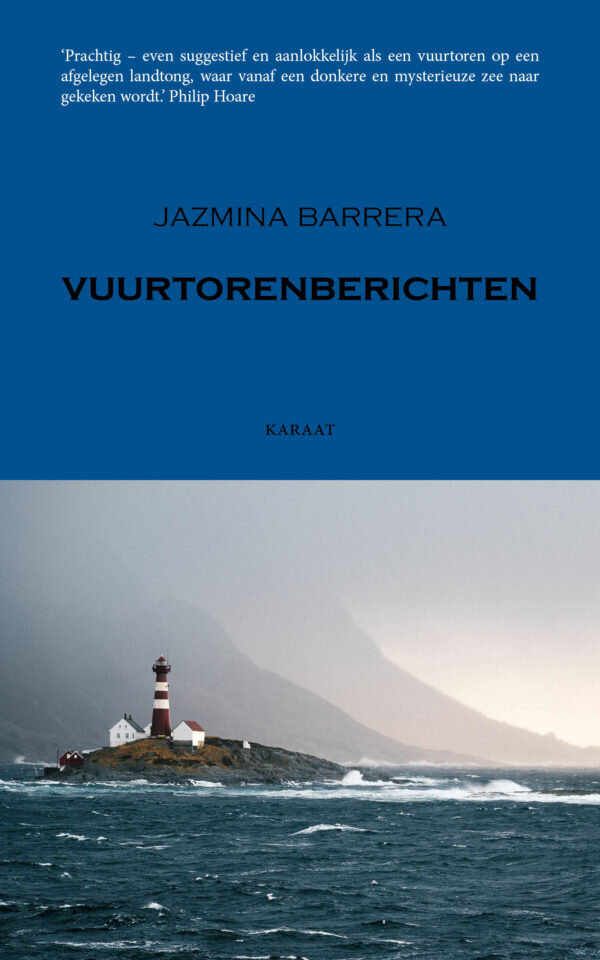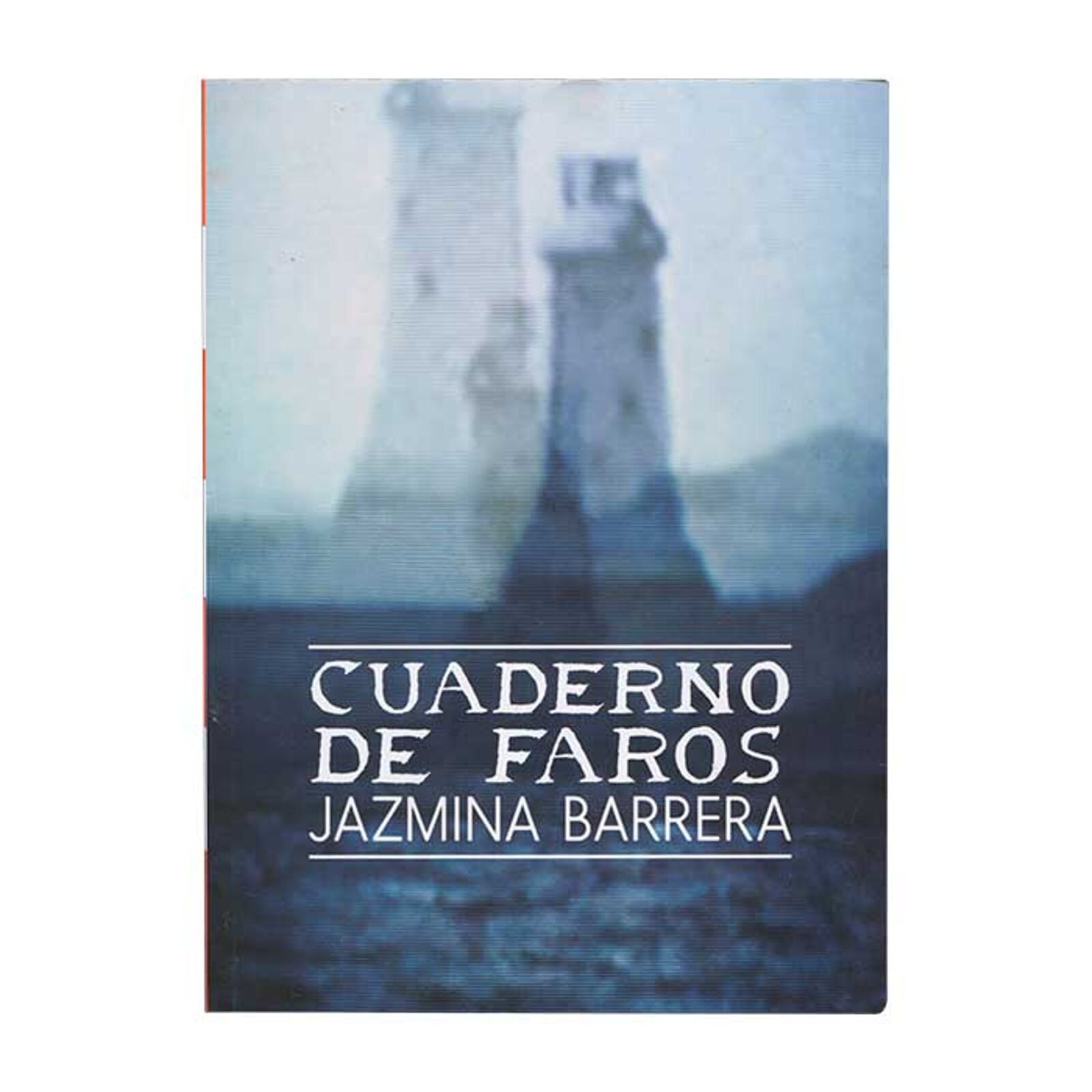Cuaderno de faros
Jazmina Barrera
ESSAYS | 2017 | 124 pages
PEN TRANSLATES AWARD WINNER
The essays in this volume constitute a collection patiently fed with travel notes, personal essays, memories of readings and historical references. The author takes the reader on trips to discover some real lighthouses—such as the one in Alexandria–and others literary ones, such as in the works of Virginia Woolf, Lawrence Durell, Suetonio, Homer, Plinio the Elder, James Joyce, Herman Melville, José Gorostiza or Luis Cernuda. In the meantime, she invites us to reflect on the limits of collecting, which she questions with a lucid point of view, marked by yearning.
As the Spanish author Antonio Muñoz Molina wrote, “Jazmina Barrera has woven a narrative that is both poetic and informative, full of bizarre and particular details as well as suggestions that reverberate throughout, much like musical motifs. The lighthouses contained in this notebook are real lighthouses that still light up at night on coasts throughout the world as well as lighthouses that faded centuries ago, and a few lighthouses that never existed, mythological lighthouses and engineers’ projects, lighthouses that are undoubtedly gifted with a symbolism that passed through the history of literature and that seem to be located in a very deep part of our psychological vocabulary, of the catalogue of images that exist just as vividly both in reality and in dreams.”
Read an excerpt in The Paris Review here.
RIGHTS: spanish LIBROS DEL ZORRO ROJO I spanish (argentina, uruguay, peru) ALTO POGO | english (world) TWO LINES PRESS I dutch KARAAT I italian LA NUOVA FRONTIERA I french DALVA | portuguese (brazil) EDITORA MOINHOS | german DORLEMANN | spanish audio STORYTEL
“Her passion for lighthouses, both literary and physical, led young Mexican author Jazmina Barrera to visit six of them scattered throughout the world. Cuaderno de faros is the book, both pleasant and short enough to be easily consumed in one sitting, that chronicles her journey. The stories that make it up weave together personal anecdotes with all kinds of legends and testimonies about these luminous towers, in a style that works in harmony with that of other traveling women like Marta Rebón or Olivia Laing who have recounted their journeys throughout different cities, intertwining them with ample knowledge about art and literature. ”
“Through its fascination with lighthouses: their mythologies, histories, operational minutia, iconic personages (all those anonymous lighthouse keepers of every coast); and also with concise poetic prose about Barrera’s lighthouse-obsessed wanderings, this book will literally enchant you. To read Jazmina Barrera’s extraordinary book is to find a little lighthouse inside yourself, one that will go on emitting a roaming, yearning, beckoning, consoling loveliness.”
“When talent is combined with vigor, a book like Cuaderno de faros can serve as a trap door that, when opened, gives us access to interconnected universes. Cuaderno de faros…collects notes from trips to six “houses of light” scattered throughout the world, from Oregon to Asturias. But within its pages is a serene procession of figures such as Walter Scott, Beckett, Cernuda, Michelet, Bradbury, Poe, Stevenson, Suetonio, Melville, and, of course, Virginia Woolf, among others. And, to bind the group together, Barrera reflects about the act of writing and distances herself from it in order to judge it, wring it out, condemn it, and, of course, give herself entirely to it. Just over a hundred pages, in short, to discover the powerful pull of a text that forges its own path while sprouting from the page like vines. ”
“A fascinating journey through fact and fiction told in smooth and soothing prose from the author, who reveals her feelings and visions to readers so they too can contemplate every dimension of what truly lies behind the darkness and the fog, both real and imagined. In this way, lighthouses pull us into an intimate epic, with a narrative voice that is silky and vivid. Writers, engineers, characters both real and fictional, and lighthouse keepers all travel along with the author. With them, she explores the dimensions of solitude, estrangement, and the hope of lighting the way for humanity. Cuaderno de faros is one of those works that distinguishes itself from reality, that goes beyond what is visible and solid and searches for the intangible, that which lives in the deepest corners of our nature. ”
“Cuaderno de faros is an essay in the form of a diary—and simultaneously, in the form of a confession. An essay comprised of notes that makes us conscious of our own life, that brings us to authors we may know but whose smaller points of brightness we may not have yet seen. We should make Jazmina Barrera our companion in reading. I think the importance of this book lies in its ability to make us see that our little obsessions can anchor small bursts of light in others. At least, that’s what happened to me upon reading Cuaderno de faros. Reading it made me want to write. Reading it made me want to dive into those little obsessions that keep me alive and afloat. And, best of all, reading it has made me want to share them. Isn’t that what’s wonderful about reading a book? ”
“I have read the book twice and kept it close at hand at night—a light in dark times. There is such strange comfort here, a secret dream we all vainly nurture: that in these hollow, haunted bodies, staring blankly out into the vacant world, lies something innately beautiful. Barrera has given every lonely soul and reader a lighthouse all her own—a fixed point, in days of solitude—a mental anchor to the earth as we drift aimlessly at sea.”
“These subtle, reflective observations offer delightful insights into the lighthouse mystique.”
“Jazmina Barrera’s On Lighthouses is a thoughtful, lovely meditation on isolation and connection. She travels the world, meeting friends, kin, strangers, and historical figures, all while seeking out lonely lighthouses and digging deep into her solitary ‘collecting’ process. The book is as liminal as its subject — separate from others, but in service to them; not urgent, but just possibly the single slight thing needed to keep a reader from the rocks.”
“Jazmina Barrera’s collection appears on the surface to be six poignant personal essays littered with intriguing references to lighthouses, their keepers and their myriad influences on literature and art throughout history, what comes through is a dark and often obsessive meditation on what it feels like to squirrel yourself away from the world and embrace isolation in the name of pursuing a passion.”
“Her graceful sentences ensnare tidbits of history and tantalizing glimpses of her own life, accompanied by delicate sketches of lighthouses she’s visited, making this book a refuge from everyday life, a place of enchantment and safety. ”
“Cuaderno de faros is a first-person narrative filled with nostalgic connections that is about understanding even what is scariest and deepest, about what it’s like to go on a journey collecting lighthouses—a journey of heroism, of facing the ocean and facing life, like Argonauts, of trying to return in the best way possible with victories and failures alike. However, as the Mexican author affirms at the end of her book, “there is no way to return” from this trip, it’s the reason why sailors always eventually leave again. ”
“A beautiful book, as I said before; Cuaderno de faros is simultaneously filled with unforeseen artists and unknown events, both of which are worthy of being treasured, perhaps even in a separate notebook.”
“The book, which parts from six key lighthouses, unfurls personal anxieties, literary reflections, and the reading of abundant literature dedicated to those mysterious towers of light.”
“It is not a melancholic essay, despite what one might think. It’s written with the enthusiasm of a collector or a naturalist who seeks to exhaust an object not as an act of erudition but as an act of love. Architectural details, types of lighthouses, family histories, what do I know...”
“This is a glorious, beckoning story, catching enlightening glimpses of literature and vivid experience in its flashing beams; beautifully written, it is as evocative and as alluring as a lighthouse glimpsed on a distant headland from a dark and mysterious sea.”
“Reading Cuaderno de faros by Mexican author Jazmina Barrera (Mexico City, 1988) has been a wonderful surprise. The simplicity of the title or the warmth of Pepitas de Calabaza’s edition could make us expect a merely pleasant read, lovely but light, trivial entertainment or a revindication of emotions...and it is pleasant, lovely, and revindicating, yes, but it’s not exactly simple, and it’s full of important information, high culture, and philosophical depth.”
“A fairly short book, On Lighthouses encourages readers to take time to linger in its wide open, hazy spaces. It is a multifaceted collection, vibrant in its constant search for more iterative complexity, meant to be read slowly and considerately.”
“[MacSweeney] is drawn to works that exists outside the confines of a single genre, especially those that merge the visual and literary. The latest addition to this impressive ensemble is Jazmina Barrera’s On Lighthouses, a delightful, pocket-sized book chronicling Barrera’s obsession with the coastal structures of the title—from detailed descriptions of their architecture to their representations in literature and art.”
“...one of the most beautiful books in recent Mexican literature. (...) Precise and erudite, Barrera’s writing is as alluring and arresting as the landscapes and stories it conveys. Each piece is crafted with care, imbued with Barrera’s poignant critical sense and her perspicacious ability to unravel the different levels of affect, historicity, and magnificence that constitute the everyday life of each lighthouse.”
“Quaderno dei fari by Mexican author Jazmina Barrera is decidedly an unusual and very fascinating book. Upon opening it, you have the impression of entering a chest full of precious treasures, precisely those you would find at the bottom of the ocean (...) The austere lighthouses are so precious that we feel immediately trapped by these lofty buildings, infected by them. Barrera’s beautiful writing, sublime and enthralling, helps a lot.”
“A travel journal, yes, but of a trip with two dimensions: one across the coasts to discover the guardians of the ocean, and the other through the oceans that those of us who inhabit the planet have inside.”
BY JAZMINA BARRERA:
La reina de espadas
NONFICTION, 2024
Punto de cruz
NOVEL, 2021
Los nombres de los animales
CHILDREN’S, 2021
Linea nigra
ESSAYS, 2020
Cuaderno de faros
ESSAYS, 2017
Cuerpo extraño
ESSAYS, 2013









